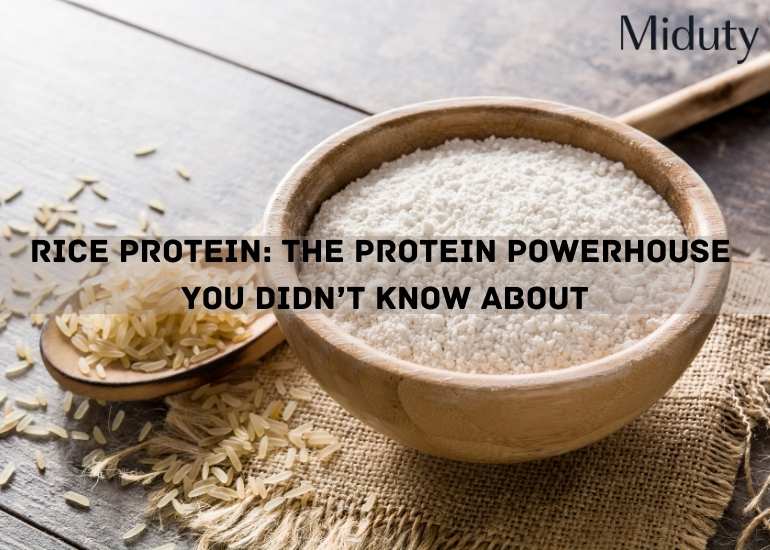
Rice Protein: The Protein Powerhouse You Didn’t Know About
The importance of protein to our overall health and well-being cannot be overstated. Often referred to as the building blocks of the body, proteins play a crucial role in many of the body's most vital processes, including tissue development, repair, and immune system support.
Whenever we think of protein, non-vegetarian sources like meat and eggs are usually the first to come to mind. However, this perception is rapidly changing. Thanks to advancements in nutrition and increasing awareness, many people are now turning to plant-based protein options to meet their dietary needs.
One such plant-based gem is rice protein-a lesser-known but incredibly beneficial protein source derived from brown rice. Let's explore why rice protein benefits your health and how it fits seamlessly into your lifestyle.
Rice: More Than Just a Staple Food
Rice has been a constant presence on the Indian dining table for centuries. It's not just a staple; it's a cultural icon. Across regions, rice appears in countless dishes, from biryani to pulao and khichdi, showcasing its versatility.
Despite this widespread love for rice, many people remain unaware of its hidden treasure-rice protein. Extracted from brown rice, this protein is packed with essential amino acids and is an eco-friendly, hypoallergenic alternative to conventional animal-based proteins.
What is Rice Protein?
Rice protein is a high-quality, plant-based protein derived from brown rice. The manufacturing process involves isolating the protein from the whole grain using enzymes to break down carbohydrates and fats, resulting in a fine, nutrient-dense powder.
What sets rice protein apart is its hypoallergenic nature. It's free from common allergens like dairy, soy, and gluten, making it an excellent option for those with dietary sensitivities or preferences. Moreover, it's vegan and vegetarian-friendly, making it a go-to protein source for individuals seeking to minimize animal product consumption.
Being a complete protein, rice protein contains all nine essential amino acids that the body cannot produce on its own. This makes it ideal for fitness enthusiasts, athletes, and anyone looking to improve their overall health and wellness.
9 Health Benefits of Rice Protein

Rice protein, derived from brown rice, serves as an exceptionally nutritious plant-based protein source. It is an ideal option for individuals seeking to enhance their overall health and achieve specific fitness objectives. The following outlines the key health benefits associated with rice protein:
1. Rich Amino Acid Profile
Rice protein distinguishes itself from other plant-based sources, such as legumes, nuts, and seeds, by providing all nine essential amino acids necessary for human health. As a complete protein, it facilitates muscle development and repair, supports the immune system, and contributes to overall body composition improvement.
2. Facilitates Muscle Growth and Recovery
Characterized by a high concentration of leucine, an important amino acid for muscle protein synthesis, rice protein is beneficial for muscle development and recovery following exercise.
3. Aids in Weight Management

For individuals aiming to reduce body weight, rice protein is a low-fat and low-carbohydrate option that promotes weight loss and helps maintain a healthy weight. Its protein content promotes satiety, which can lead to a reduction in overall calorie intake, thereby supporting weight management goals.
4. Easily Digestible
Rice protein is readily absorbed, making it suitable for individuals with sensitive digestive systems. It is also free from common allergens, including dairy, soy, and gluten, ensuring its safety for a wide range of consumers.
5. Contributes to Cardiovascular Health

Rice protein is rich in the amino acid arginine, which has been shown to enhance blood flow and potentially reduce the risk of cardiovascular disease.
6. Possess Anti-Inflammatory Properties
The presence of peptides in rice protein imparts anti-inflammatory benefits, making it a valuable option for individuals suffering from inflammatory conditions such as arthritis.
7. Helps Lower Cholesterol Levels
Unlike animal-based protein sources that are often high in saturated fat, rice protein is naturally low in saturated fat, which is associated with elevated cholesterol levels. Research published in the National Library of Medicine indicates that the consumption of rice protein may improve lipid profiles by lowering LDL (commonly referred to as "bad" cholesterol) and increasing HDL (often referred to as "good" cholesterol), thereby reducing overall cholesterol levels and the associated risk of heart disease.
8. Regulates Blood Sugar Levels
With a low glycemic index (GI), rice protein does not substantially elevate blood sugar levels, making it suitable for individuals with diabetes or those seeking to manage their blood sugar effectively.
9. Free from Gluten and Common Allergens
Rice protein is a non-allergenic option, devoid of common allergens such as dairy, soy, and gluten. This characteristic makes it advantageous for individuals with dietary sensitivities or allergies.
How to use Rice Protein in your Diet?
One of the best things about rice protein is its versatility. Whether you're a busy professional, a fitness enthusiast, or someone who loves experimenting in the kitchen, you'll find countless rice protein uses to suit your needs:
1. Smoothies
Add a scoop of rice protein powder to your morning smoothie for a protein-packed breakfast. Pair it with fruits, vegetables, and your favorite plant-based milk for a delicious and nutritious start to the day.
2. Baked Goods
Enhance the protein content of baked items like muffins, pancakes, and bread by incorporating rice protein powder into your recipes.
3. Protein Bars
Create your own protein bars using rice protein powder, nut butter, and other wholesome ingredients for a convenient on-the-go snack.
4. Soups and Stews
Boost the nutritional profile of soups and stews by adding a scoop of rice protein powder to the mix.
5. Salad Toppers
Sprinkle rice protein over your salads or grain bowls for an easy protein boost.
Choosing the Right Rice Protein Supplement
While brown rice is a natural source of rice protein, supplements offer a more concentrated form. When choosing a rice protein supplement, look for products free from artificial sweeteners and additives to ensure you're getting the best quality.
Is made from premium quality brown rice, carefully processed to retain its protein content, and contains Xylitol which is a natural low-caloric sweetener that is perfectly safe for you.
Additionally, It provides a powerful dose of MCT fat to keep cravings at bay.
Conclusion
If you're searching for a sustainable, plant-based protein to meet your fitness and nutritional goals, look no further than rice protein. Packed with essential amino acids, this hypoallergenic and easily digestible protein is ideal for everyone-from athletes to individuals with dietary restrictions.
Not only does it offer numerous health benefits like improved muscle recovery, weight management, and heart health, but it's also versatile enough to fit into any meal or snack.
So why wait? Start exploring the world of rice protein today and reap the countless health benefits it has to offer!

Frequently Asked Questions on Rice Protein -
Q1. Is rice a good source of protein?
Rice is a staple food and an important source of protein in many regions around the world. The protein in rice is generally considered hypoallergenic, and several studies have highlighted the nutritional and health benefits associated with consuming rice proteins.
Q2. What is rice protein called?
Rice protein that has been broken down into smaller fragments is known as rice protein hydrolysate. This form of rice protein is consumed to enhance muscle strength and alleviate muscle soreness. Additionally, it is used in infant formulas for babies with allergies to cow's milk.
Q3. Is rice good for bulking?
Natural sugars from fruit can effectively support your clients' bulking goals. White rice is often considered one of the best foods for building muscle. It offers a high volume of carbohydrates per serving and serves as a great filler. Pairing rice with some vegetables and protein creates an ideal post-workout meal.
Q4. Is rice easy to digest?
White rice is well-known for being easy to digest. It is low in fat and fiber, which makes it gentle on the stomach. Many athletes prefer white rice over brown rice because it is less likely to cause gastrointestinal issues.








